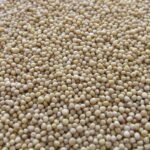Step into the world of cloves, as we trace its rich history, diverse culinary uses, remarkable nutritional value, and astonishing health benefits.
The Spicy Legacy of Cloves
Who’d have thought that tiny, nail-shaped spices called cloves, native to the Maluku Islands in Indonesia, could wield such power in our kitchens and health routines? Traded globally for over 2,000 years, cloves have spiced up our lives, making their mark in food, medicine, and even as a status symbol in social rituals.
These little flavor bombs are actually the unopened flower buds of the clove tree (Syzygium aromaticum), harvested by hand and then dried until they turn a deep, burnished brown. Their pungent aroma, strong, spicy flavor, and eugenol oil content have all made cloves a valuable commodity.
From the Spice Rack to the Plate: Clove’s Culinary Voyage
When it comes to culinary versatility, cloves are no slouch. They’re a cornerstone in a potpourri of dishes across global cuisines. From infusing depth into meats and curries to brewing a comforting cup of chai, there’s hardly a savory or sweet boundary that cloves haven’t crossed.

And don’t forget clove oil – it’s a superhero in its own right! Used in everything from desserts to mouthwashes, it’s the secret ingredient that often makes us go “Hmm, what’s that delightful flavor?”
Digging Into the Nutritional Goldmine of Cloves
While cloves are an undeniable culinary star, their nutritional prowess is equally impressive. Packed with antioxidants and offering a host of health benefits – from combating inflammation to preserving oral health, cloves are nature’s very own wellness package.
Here’s the breakdown of what 2 grams (roughly a teaspoon) of cloves bring to the table:
| Nutrient | Value |
|---|---|
| Calories | 6 |
| Fat | 0.27g |
| Carbohydrates | 1.38g |
| Protein | 0.13g |
| Fiber | 0.7g |
| Vitamin C | 1.7mg |
| Calcium | 11mg |
FAQs
Can you eat cloves raw?
You bet! While cloves are typically used in cooking, you can also eat them raw. But beware – they have a very strong flavor, so you might want to start slow.
What are some health benefits of cloves?
These tiny powerhouses are full of antioxidants and are known for their anti-inflammatory, antidiabetic, and antimicrobial properties. They can also support liver health and help regulate blood sugar levels.
Parting Thoughts on Cloves
From their humble origins on the Maluku Islands, cloves have traveled far and wide, winning hearts and tantalizing tastebuds. This kitchen favorite has proven itself as a culinary star and a health champ.
So, next time you sprinkle a dash of cloves into your stew or sip on some clove-infused tea, remember – you’re not only enjoying a flavor fiesta, you’re also tapping into a historical and nutritional goldmine!
Fun Facts about Cloves
1. Cloves were used in China as far back as 600 BC for freshening breath.
2. During the 17th and 18th centuries, cloves were worth their weight in gold.
3. The word ‘clove’ comes from the Latin word ‘clavus’, which means nail, referring to the shape of the bud.
Sources: ncbi.nlm.nih.gov




